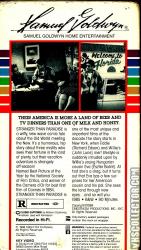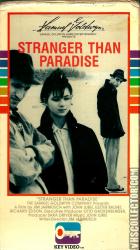Stranger Than Paradise
Catalog Number
6896
-
Primary Distributor (If not listed, select "OTHER")
Catalog Number
6896
Primary Distributor (If not listed, select "OTHER")
Release Year
Country
90 mins (NTSC)
N/A | N/A | N/A
N/A | N/A
Stranger Than Paradise (1984)
Additional Information
Additional Information
Although Jim Jarmusch made his directorial debut with Permanent Vacation (1982), Stranger than Paradise (1984) marked his breakthrough as a major American filmmaker. One of the most deadpan comedies ever committed to film, Stranger than Paradise suggests a Buster Keaton film written by Samuel Beckett and Jack Kerouac and directed by Andy Warhol. Willie (John Lurie) is a small-time gambler whose distant cousin Eva (Eszter Balint) is moving to America from Eastern Europe and informs him that she'll need to stay with him for ten days. Willie isn't happy to have Eva around, but after Willie introduces her to the joys of American cigarettes and TV dinners ("You got your meat, you got your potatoes, you got your vegetables, you got your dessert and you don't have to wash the dishes -- this is how we eat in America!"), Eva steals a frozen meal and a pack of smokes from the corner store, and Willie is both surprised and impressed. His buddy Eddie (Richard Edson) happens by, and they hang out with Eva just long enough to develop a fondness for her before she moves on to Ohio, where she'll live with her Aunt Lottie (Cecillia Stark). Months later, Willie and Eddie score $600 in a poker game and decide to visit Eva in Ohio. However, it's the dead of winter, and they have nothing to do except look at the frozen surface of the lake. The three eventually head down to the tacky paradise of Miami, where Willie and Eddie try their luck with the ponies and Eva decides what to do next. Stranger than Paradise is a film that defines the notion, "It's not what you say, but how you say it." Shot in long, static takes, its style is minimalism itself, but the post-beatnik cool of John Lurie, Richard Edson and Eszter Balint somehow betrays the fact that they care about each other, and a loopy charm and subtle but potent humor seeps through the film's stark black-and-white images. Stranger than Paradise began as a short subject which was made possible by German director Wim Wenders, who gave Jarmusch a supply of film stock left over from one of his projects, and it went on to become one of the most influential movies of the 1980s, casting a wide shadow over the new generation of independent American filmmakers to come. ~
Stranger Than Paradise is a 1984 American absurdist/deadpan comedy film. It was written and directed by Jim Jarmusch and stars jazz musician John Lurie, former Sonic Youth drummer-turned-actor Richard Edson, and Hungarian-born actress Eszter Balint. The film features a minimalist plot in which the main character, Willie, has a cousin from Hungary, Eva, stay with him for ten days before going to Cleveland. Willie and his friend Eddie eventually go to Cleveland to visit Eva.
he film was shown at the Cannes Film Festival, where it won the Caméra d'Or award for debut films (1984). It also won the Golden Leopard and the Prize of the Ecumenical Jury – Special Mention at the 1984 Locarno International Film Festival, the Grand Prix of the Belgian Film Critics Association, the Special Jury Prize at the Sundance Film Festival in 1985 and National Society of Film Critics Award for Best Picture of 1985, the film went on to win the Kniema Junpo Award for best foreign language film in 1987, the award for National Film Registry at the National Film Preservation Board, USA in 2002.[2]
The film made $2,436,000,[3] significantly more than its budget of around $100,000.[4]
Film critic Pauline Kael gave the film a generally positive review.
The first section is set in the bare Lower East Side apartment of Willie, who is forced to take in Eva, his 16-year-old cousin from Budapest, for ten days. The joke here is the basic joke of the whole movie. It's in what Willie doesn't do: he doesn't offer her food or drink, or ask her any questions about life in Hungary or her trip; he doesn't offer to show her the city, or even supply her with sheets for her bed. Then Eddie comes in, even further down on the lumpen scale. Willie bets on the horses; Eddie bets on dog races. Eva, who never gets to see more of New York than the drab, anonymous looking area where Willie lives, goes off to Cleveland to stay with Aunt Lotte and work at a hot-dog stand. And when Willie and Eddie go to see her, all they see is an icy wasteland – slums and desolation – and Eddie says 'You know it's funny. You come to someplace new, and everything looks just the same.' The film has something of the same bombed-out listlessness as Paul Morrissey's 1970 Trash – it's Trash without sex or transvestism. The images are so emptied out that Jarmusch makes you notice every tiny, grungy detail. And those black-outs have something of the effect of Samuel Beckett's pauses: they make us look more intently, as Beckett makes us listen more intently.[5]
The film was voted the Best Picture of 1984 by the National Society of Film Critics.[6]
Release Date:
October 1, 1984
Distrib: Samuel Goldwyn
Stranger Than Paradise is a 1984 American absurdist/deadpan comedy film. It was written and directed by Jim Jarmusch and stars jazz musician John Lurie, former Sonic Youth drummer-turned-actor Richard Edson, and Hungarian-born actress Eszter Balint. The film features a minimalist plot in which the main character, Willie, has a cousin from Hungary, Eva, stay with him for ten days before going to Cleveland. Willie and his friend Eddie eventually go to Cleveland to visit Eva.
he film was shown at the Cannes Film Festival, where it won the Caméra d'Or award for debut films (1984). It also won the Golden Leopard and the Prize of the Ecumenical Jury – Special Mention at the 1984 Locarno International Film Festival, the Grand Prix of the Belgian Film Critics Association, the Special Jury Prize at the Sundance Film Festival in 1985 and National Society of Film Critics Award for Best Picture of 1985, the film went on to win the Kniema Junpo Award for best foreign language film in 1987, the award for National Film Registry at the National Film Preservation Board, USA in 2002.[2]
The film made $2,436,000,[3] significantly more than its budget of around $100,000.[4]
Film critic Pauline Kael gave the film a generally positive review.
The first section is set in the bare Lower East Side apartment of Willie, who is forced to take in Eva, his 16-year-old cousin from Budapest, for ten days. The joke here is the basic joke of the whole movie. It's in what Willie doesn't do: he doesn't offer her food or drink, or ask her any questions about life in Hungary or her trip; he doesn't offer to show her the city, or even supply her with sheets for her bed. Then Eddie comes in, even further down on the lumpen scale. Willie bets on the horses; Eddie bets on dog races. Eva, who never gets to see more of New York than the drab, anonymous looking area where Willie lives, goes off to Cleveland to stay with Aunt Lotte and work at a hot-dog stand. And when Willie and Eddie go to see her, all they see is an icy wasteland – slums and desolation – and Eddie says 'You know it's funny. You come to someplace new, and everything looks just the same.' The film has something of the same bombed-out listlessness as Paul Morrissey's 1970 Trash – it's Trash without sex or transvestism. The images are so emptied out that Jarmusch makes you notice every tiny, grungy detail. And those black-outs have something of the effect of Samuel Beckett's pauses: they make us look more intently, as Beckett makes us listen more intently.[5]
The film was voted the Best Picture of 1984 by the National Society of Film Critics.[6]
Release Date:
October 1, 1984
Distrib: Samuel Goldwyn
2
0






Comments0
Login / Register to post comments